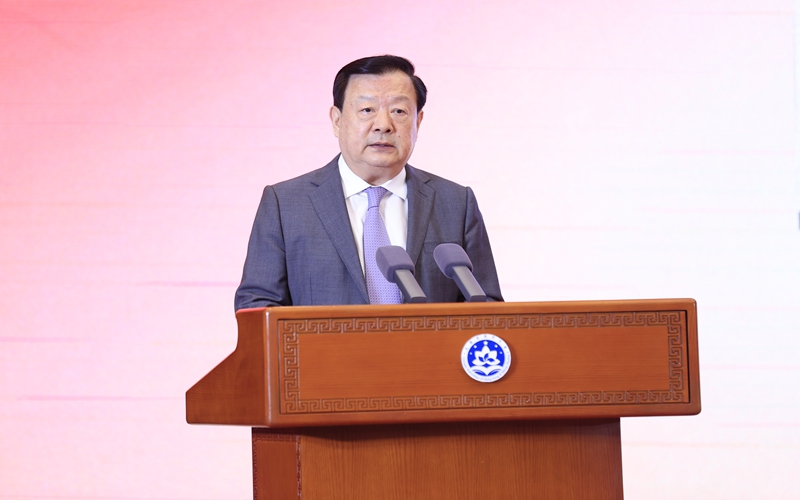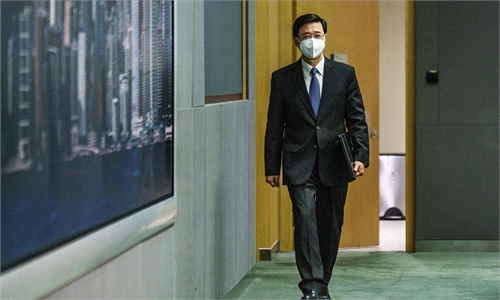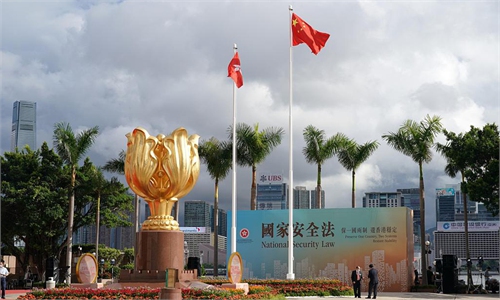Top Chinese official for HK affairs meets HK representatives, eyeing local district council review

Xia Baolong, vice chairman of the National Committee of the Chinese People's Political Consultative Conference (CPPCC) and head of the Hong Kong and Macao Affairs Office of the State Council, speaks at a panel discussion in studying Chinese President Xi Jinping's latest speech in Hong Kong. Photo: Courtesy of the Hong Kong and Macao Affairs Office of the State Council
Xia Baolong, China's top official on Hong Kong and Macao affairs, recently met with representatives from Hong Kong society and learned more about the situation in Hong Kong including the local government policies and administrative review of local district councils, the Hong Kong and Macao Affairs Office of the State Council said on Tuesday.
Xia, vice chairman of the National Committee of the Chinese People's Political Consultative Conference and head of the Hong Kong and Macao Affairs Office of the State Council, held a meeting in Shenzhen with officials from the Hong Kong Special Administrative Region (HKSAR) including Chief Secretary for Administration Eric Chan Kwok-ki, Secretary for Constitutional and Mainland Affairs of Hong Kong Erick Tsang, and Secretary for Home and Youth Affairs Alice Mak Mei-kuen, local media reported on Tuesday.
An unnamed representative who attended the meeting revealed that the HKSAR government is conducting a review of district councils as the operations of these bodies have deviated from the original intention of assisting the HKSAR government in its governance and have even become a venue for political conflict, local media HK01.com reported.
The review this time is not limited to the review of functions but also the review of the components of the councils, the representative said. And the composition of district councils may not necessarily be formed only through direct elections in districts.
However, whether to reintroduce the appointment system or use other methods, such as the proportion of directly elected seats, are topics that need to be discussed and reviewed while the most important thing is to underscore executive leadership, according to media reports.
When it comes to the situation of Hong Kong, John Lee, chief executive of the HKSAR government, told at a press conference on Tuesday that he hopes to the legislation of the Article 23 could be finalized within this year or next year.
Lee emphasized that the HKSAR has the constitutional responsibility to enact the Article 23 of the Basic Law as soon as possible. Currently, society may not fully grasp the seriousness of the issues targeted by the legislation as the national security risks have been changing frequently with growingly complex international relations. There are possibilities that the national security risks are still lurking in the city, which requires the consolidation of multifaceted mechanisms for safeguarding national security.
Some experts believed that disclosure of information about the meeting between central government and HKSAR government officials showed that the central government increased the transparency in its Hong Kong and Macao-related work.
"It also shows that the central government is fully implementing its full administrative power and focusing on One Country, Two Systems," Lau Siu-kai, a consultant from the Chinese Association of Hong Kong and Macao Studies who is also a senior policy advisor, told the Global Times on Tuesday.
It is also normal for the central government to pay attention to the review of local administrative structure when it comes to the review of district councils, Lau noted. "Local district councils should not become a political battleground and they are not simply providing consultation to the local government but need to mobilize community to improve people's livelihoods," he said.



